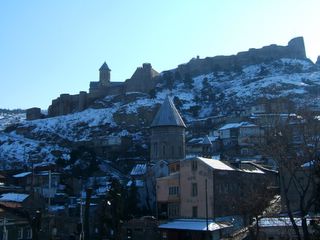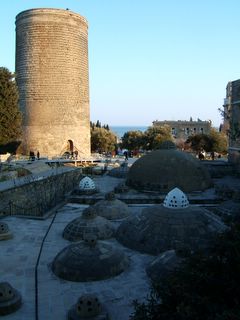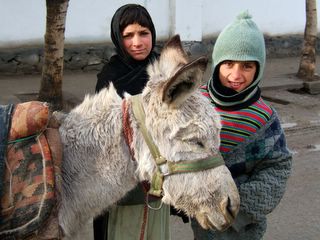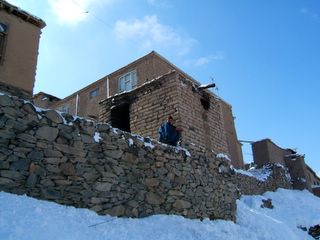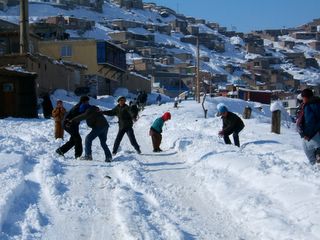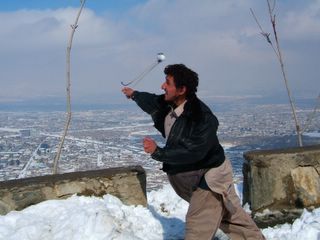Thursday, February 24, 2005
Zugdidi
A truism in economic development is that the bulk of investment gets sucked into the capital while the regions languish. Georgia is no exception to this rule. While Tbilisi, the capital, has 24 hours of electricity a day during the winter, the regions get eight. Still, it's better than what they had during my years here: none at all. Also during my time, the roads between Kutaisi and Zugdidi were so potholed it took two hours to drive the 40 miles between them. Now the roads have been repaired and it only takes one. While the regions lag behind Tbilisi, I think they are moving forward.
Another example of this is the city Zugdidi, in west Georgia. On the edge of the conflict zone with the breakway region, Abkhazia, Zugdidi used to be a lawless dark spot on the map. I never traveled there - the threat of kidnapping or a gunshot wound was too high. So it was for the first time, this week, that I visited the town. Its roads are still guarded by bored-looking Russian peacekeepers, and it's still economically depressed, but I didn't fear for my life. Things were better, the people I spoke with in Zugdidi agreed. Maybe not good, but better.
Wednesday, February 23, 2005
Berikowpa
The Georgians have their own version of Mardi Gras, called Berikowpa. Young men dressed in funny costumes caper about, dancing and playing instruments. However, rather than throwing plastic beads to spectators, they block the roads and request payment for passage, while other villagers laugh and point. What do you get for the “toll?” A good laugh and wishes for a happy spring.
At least, that's what happens the first time you’re stopped. By the third road block, it was all I could do to keep our driver from running over the revelers. Berikowpa lasts about a week before spring starts, and as far as I can tell it has no connection to Lent (also unlike Mardi Gras). Oddly enough, though Berikowpa is an old tradition, this is the first year I’ve seen it. I’m not sure if this represents a rise in patriotic fervor, or simply now that the traffic cops are no longer shaking down motorists every 20 km., the average citizen has taken a hand in it. However, I suspect the former.
Saturday, February 19, 2005
Changes
When you’re living inside something, it’s difficult to see its changes. But to my eyes, Tbilisi has changed. In the capital, at least, power outages are now unusual occurrences (when I lived here, we had electricity only a few hours a day during the winter). The bloated and corrupt traffic police were disbanded and replaced with a smaller cadre of younger men who receive salaries rather than rely upon extortion from motorists. They have zippy new Volkswagon police cars too, and I have yet to see one of the cars in motion without its flashing lights on, even when they’re just taking a leisurely drive down the street. Georgians now admit that the police might not be the criminals they used to be. It’s a tremendous step forward in what was once one of the most corrupt countries in the world.
But there is still a long way to go. While trust in government isn’t at the all-time low it was prior to the Rose revolution, the cynicism is remarkable. The streets are thick with conspiracy theories about the recent and mysterious death of Zhvania, the prime minister, who did not march in lock-step with the president. Whether this extreme distrust in government is warranted or just part and parcel of the Georgian passion for drama is unclear.
In Georgia, there are never accidents – only skullduggery and the wrath of God. Killed while driving? It wasn’t because the driver was drunk, it was because he’d been drinking and then gone to church. Or it was a KGB hit. Or the mafia. Or, a wealthy businessman caused the accident and paid a bribe to cover it up. While the change in government has made some of these fantasies less likely, it hasn’t halted the Georgians’ natural tendency to grope for them.
Thursday, February 17, 2005
Tuesday, February 15, 2005
Tbilisi
I’m a sucker for Tbilisi. My infatuation is no doubt driven by the fact I spent nearly four years of my life here. But I wouldn’t have stayed if I hadn’t been enjoying myself. If Baku is oil and caviar, Tbilisi is wine and romance. The Georgians are famous for their wine (which has a high percentage of vitamin P!) and their capital is simply magic.
Tbilisi is built on a valley, and a river runs along the bottom, splitting the city in two. Walking the cobbled streets, I sometimes feel I’ve fallen into a cartoon. The buildings lean at odd angles, pastel-colored plaster crumbles from walls, paint flakes off the lace-like balcony railings, and towering over it all stands a blocky metal statue of a woman holding a sword in one hand and a bowl in the other. It’s the Mother of Georgia, and the bowl of wine is for her friends and the sword for her enemies. When I first arrived here, five years ago, every Georgia would point her out and tell me the story, but no one could tell me about the much lovelier ruined fortress next door to her – the 11th century Narikala fortress, to be precise.
Monday, February 14, 2005
City EScape
After spending all of Saturday in the Kabul airport (which lacks runway lights and janitorial services, in addition to radar), and a good part of Sunday, I finally escaped Kabul on Sunday afternoon. Never was I so happy to set foot upon decrepit Azal Airlines, or to arrive in the Baku airport, which was bright and shiny clean.
I tried to declare an Afghan mirror frame I’d purchased, certain that I’d have problems with it on the way out, but the customs officials insisted I didn’t need to, so I didn’t. My hotel room at the Old City Inn (a fabulous bargain and charming hotel run by students in training) was still waiting for me. I spent the evening wandering the old city, and wound up at a British pub, getting lessons in rugby from a crowd of French embassy workers who had been on the same plane as I.
The next morning, all my fears came to fruition as the customs officials challenged my right to take the mirror frame from the country. I explained it all: I’d just arrived from Afghanistan, it wasn’t an antique, it only cost me $25, and I’d been told I didn’t need to declare it. They checked my passport and verified that I had indeed just arrived from Afghanistan. Then the inspector turned the page and found… an Armenian visa! Horror!
The Azeris and Armenians have been in a state of cold war over the Karabagh for years, and feelings still run high. And so the interrogation began. Why had I been in Armenia? Had I worked there? When had I been there? For how long? An elderly Georgian gentleman joined the fray on my behalf, and I eventually got out and on the plane to Tbilisi, Georgia, with my mirror frame.
I didn’t get to declare it in Georgia either
Friday, February 11, 2005
Word of the Day: Kabuled
Kabuled. To be destroyed due to a sub-standard infrastructure, typically in an ironic and painful fashion. E.g.: The airport shut down for no apparent reason, and my plans to leave were kabuled.
http://adventurersclub.blogspot.com
Wednesday, February 09, 2005
Headlines
I bought an English-language “Kabul Weekly,” attracted by its headline: “Behind the Chinese Lantern, Guesthouses or Brothels?” Brothels posing as Chinese restaurants are sprouting like mushrooms, and the crackdown has been interesting to watch, teamed up as it is with an attack on the sale of alcohol. I’m not sure if alcohol sales are illegal or only illegal to Afghans, but one can buy it everywhere.
The other big story was: “Catcalls and Text Messages Irk Kabul’s Women,” and it described how teenage males harass ladies on the street. Kabuli youths have now gone high-tech, randomly text-messaging cell-phone owners with lurid poems or even suggestive pictures, hoping to land a female recipient. Last week a young western man I know got one of these flowery poems. A secret admirer? The Danish girls he’d been out with the night before? No such luck. He hid his disappointment well, while I laughed until my sides ached.
The best part of the article, however, was its account of a young Afghan woman telling off one of these boys. Her response to his improper suggestion? “Drop dead, damn you’re father, you son of a dog!”
Then she slapped him.
Not the shrinking violet one would expect beneath a headscarf.
http://adventurersclub.blogspot.com
Cityscape
It’s difficult to describe Kabul – so difficult that I’d hoped my pictures would do the job for me. But they portray only slices of the city.
Kabul is completely flat, except for the mountains. Imagine a giant frying pan. Now splat three teaspoon-sized mounds of mashed potatoes into it. If the edges of the frying pan were towering mountains, and the mashed potatoes were the hills of Kabul, you’ll see there’s still a lot of flat bits in between. It’s disorienting when one first arrives, because it’s hard to get a sense of what’s around the hills, or where Kabul ends. Only from the air can one really get a perspective on the city, and the damage done to west Kabul by decades of civil war. From the ground, it’s a flattened, crumbling mess. From the air one sees foundations, and the outlines of bedrooms and kitchens.
Big chunks of the city are composed of Soviet-style architecture, i.e. ugly concrete blocks. The Soviets also brought their love of marble to Kabul. I never understood their passion for the material, because it’s slick as an ice rink when wet. I spend a lot of time picking my way across marble driveways and sidewalks, tiptoeing through sludgy mud puddles, evading random holes in the ground. The Afghan men (for there are few women on the streets) probably think I’m acting demure, unwilling to raise my gaze. I just don’t want to land on my butt.
And then there are the hillsides. In most places, hills are the realm of the wealthy, from which they can enjoy the views of their domain. But in Kabul, the hills are dotted with cemeteries, their green flags fluttering in the breeze, and with mud-brick houses. The wealthy of today’s Kabul are building their homes in the Wazir Akbar Khan district. These homes, still in the process of construction, are fantasy creations of colored marble and Corinthian columns, tile mosaics and stained glass. And on the street before these palaces one might find the remains of Soviet tanks.
Monday, February 07, 2005
Weather
I purchased med-evac insurance before coming to Kabul. For those unfamiliar with it, under the terms of the coverage, in case of a medical emergency the insurance provider will fly you to the nearest “western-standard” hospital. It’s terrific in countries with less-than-spectacular medical systems (medicine may have been free in the former Soviet Union, but you got what you paid for). However, this winter the Kabul airport is closed more days than not, making my high-priced evacuation plan moot.
After ten years of drought, the Kabul airport is ill-equipped to deal with the ice and snow dished out this winter (on the bright side, this may mean the drought is ending). The airport also doesn’t have radar, relying instead on the main U.S. base at Bagram. So at the mildest snow flurry it shuts down. At least they’re sensible enough to know what they can’t handle.
Meanwhile, contradictory rumors are still flying about the cause of last week's Kam Air plane crash. Pilot error? Control tower error? No one knows (or if they do, they aren't talking), but I plan to be much more careful when and how I fly. So twice a day I check the Internet for weather reports, wondering if I’ll be able to leave here on Friday.
http://adventurersclub.blogspot.com
Sunday, February 06, 2005
Snow
I’ve never seen such elaborate snow-people as those in Kabul. Along the streets I see detailed snowmen with snow-hats and snow-coats, 10-feet high snow women with scandalous figures, and even snow-children riding snow-animals.
But the snow quickly turns to slush and mud, flooding the roads with puddles four inches deep. My shoe has a hole in it – just another bit of discomfort to deal with. It’s the only pair I’ve brought, and there’s no chance of buying a new pair before I leave. So I squelch around the muddy streets and change socks often.
More disturbing in all this is the lack of a sewage system in Kabul. There’s nothing. Just holes in the ground and open trenches on the street. I met a man who is bidding on the contract to build Kabul’s sewage system. “Did you know that Kabul has the highest percentage of fecal matter in its air of any city in the world?” he asked me.
No. And I’ll be wearing my headscarf wrapped bandit-style around my face this summer, when the dust storms rage across the city. But now, in the sloppy winter, I try not to think too hard about what exactly is in those puddles.
TV Hill
I’d been itching to hike up one of Kabul’s hills, and had heard from other ex-pats that the hike up to the TV towers was doable. This weekend, I finally got my chance. The hill was dotted with communities of mud-brick houses, inhabited by squatters, I later learned. Perhaps that explains why even with male escorts (and even when one of the escorts was an Afghan), there were times when things felt a bit dicey – some people’s interest seemed friendly, others not. It wasn’t a “good” part of town, but I didn’t figure this out until too late. That’s one of the greatest dangers tourists face when abroad – it’s difficult to determine what constitutes a bad part of town. In America I can tell in an instant – here, where poverty is rampant and everything is different, no.
Wary of mines, we stayed on the road, walking in the treads left by vehicles. The sky was a brilliant blue, but a grey haze from wood fires hung low over the city. Children waved to us, calling out the only English greeting they knew, “How are you?” This high-pitched phrase was heard so often, it began to sound like the call of little birds.
It had snowed the night before and snowball battles raged. Men and boys used slingshots, which cracked like whips when the snowballs were released. I heard one window shatter, and the offender cringed, guilt written across his face.
I tried not to look like a target. But how could I not stand out? I was pelted, and am not entirely sure if it was “friendly fire” or not.
Friday, February 04, 2005
Plane Crash
No, I was not on the plane that crashed. Because of my fear of flying in bad weather on dubious airlines, I weasled out of all trips out of Kabul. The reason you haven't heard from me is because Friday is the Afghan "Saturday" (i.e. no work) so I had no e-mail access.
Unfortunately, there were over 100 people on that plane, and seven international aid workers. The international community in Kabul is tight, and it seems everyone who's been here more than a month knew someone on it. People are very upset.
Wednesday, February 02, 2005
Explosion
Overnight there was an explosion in Kabul. From my hotel it sounded like thunder. Or so I was told. I wouldn’t know; I slept through it. So much for my cat-like reflexes.
No, it wasn’t a bomb, it was one of the gas canisters used for heating. And once the source of the explosion was clarified, the foreigners breathed a sigh of relief. Nevermind that we all have gas canisters in our rooms.
This just goes to show how irrational we all can be when it comes to measuring risks. The chances of me being blown up by a terrorist are infinitesimal, and yet that fear is what preys upon all our minds. The odds of me being blown up by a gas heater? Not entirely sure how large that is. Apparently a local restaurant was blown apart by a gas canister last month. Gas explosions seem to be occurring with greater frequency than terrorist acts in Kabul.
But I’m not giving up my gas heater. There’s zero insulation in the buildings and as soon as the heat source is off, the temperature plummets. Besides, I’m only just getting over my cold.
Chelsea
Some of you may be wondering why I chose to post a photo of a store last week. There are several reasons. First, as I mentioned in an earlier post, I don’t (can’t) get out much and so far haven’t taken any exciting photos. Second, I liked the sign – or at least the sentiment. Third, this store is amazing. Cheetoes, Oreos, even Tabasco sauce is sold here. It’s got a better selection than any store I’ve seen in Eastern Europe (my usual stomping grounds) and this, frankly, surprises me.
However, these products are deceptive. Some are out and out forgeries. Others… Let’s just say that Oreos made in Hong Kong have little in common with those made in the good old US of A. They taste more like wheat biscuits with dark brown food coloring. Mind you, I’m not complaining. They’re round and have cream-flavored lard inside, and I’m thrilled to bits to have them.
Tuesday, February 01, 2005
It's Bazaar
There are a very few streets in Kabul with names and signs, and two of them are Chicken and Flower Streets. That the signs are in English should be the traveler’s first clue that he’s about to be taken for a ride… or be plucked. Shops along the streets cater to the acquisitive tourist heart – carpets, jewelry, odd bits and bobs, it’s all there. Unfortunately, the street’s magnet-like quality to westerners drew terrorists as well during the last elections. A suicide bomber killed an American woman, and several IEDs (Improvised Explosive Devices) were discovered and removed before they could go off.
But that was five months ago. I decided to risk it, and spent the afternoon happily trolling through lapis jewelry, bronze oil lamps, and silk scarves. One enterprising Afghan youth, Hamid, owns and manages his own scarf “shop” in a niche in a wall off Chicken Street. The kid can’t be more than 12, but he handed me a full-color business card, complete with a photo of himself and his scarves. His younger brother (eight?) roped in the customers and shooed off the beggars. I bought an embroidered wool shawl from Hamid and no doubt paid twice its value. The kid was ruthless, and I suspect in thirty years he’ll be running a business empire, if not the country.
In America, most businesses avoid locating next to the competition. But in the bazaar, types of businesses cluster together, taking advantage of the large volume of people flowing through in search of, say tomatoes. In Kabul, businesses locate with the bazaar mentality in mind and hence a road for tourists like Chicken Street. I’ve driven past a street with nothing but auto parts, a street for bridal gowns, a street for carpets, etc. The economist in me finds this fascinating because it’s so contrary to the Western business mentality. But it works.




